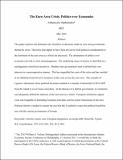The Euro Area Crisis: Politics over Economics
Author(s)
Orphanides, Athanasios
Download11293_2014_9419_ReferencePDF.pdf (493.2Kb)
OPEN_ACCESS_POLICY
Open Access Policy
Creative Commons Attribution-Noncommercial-Share Alike
Terms of use
Metadata
Show full item recordAbstract
This paper explores the dominant role of politics in decisions made by euro area governments during the crisis. Decisions that appear to have been driven by local political considerations to the detriment of the euro area as a whole are discussed. The domination of politics over economics has led to crisis mismanagement. The underlying cause of tension is identified as a misalignment of political incentives. Member state governments tend to defend their own interests in a noncooperative manner. This has magnified the costs of the crisis and has resulted in an unbalanced and divisive incidence of the costs across the euro area. The example of Cyprus is discussed, where political decisions resulted in a transfer of about half of 2013 GDP from the island to cover losses elsewhere. In the absence of a federal government, no institution can adequately defend the interests of the euro area as a whole. European institutions appear weak and incapable of defending European principles and the proper functioning of the euro. Political reform is needed to sustain the euro but this is unlikely to pass the political feasibility test with the current governments of Europe.
Date issued
2014-07Department
Sloan School of ManagementJournal
Atlantic Economic Journal
Publisher
Springer US
Citation
Orphanides, Athanasios. “The Euro Area Crisis: Politics over Economics.” Atlantic Economic Journal 42.3 (2014): 243–263.
Version: Author's final manuscript
ISSN
0197-4254
1573-9678